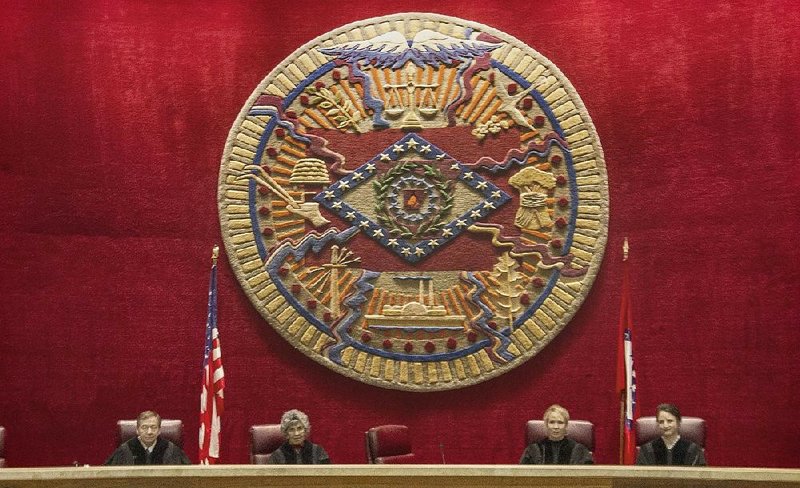A Pulaski County Circuit Court judge didn't have subject-matter jurisdiction to enter a final order regarding the constitutionality of Arkansas' mask-mandate ban, the state Supreme Court ruled Thursday.
That's because an appeal regarding a preliminary injunction in the case was pending before the Supreme Court when Circuit Judge Tim Fox made his final order on Dec. 29, 2021, according to an opinion written by Robin F. Wynne, an associate justice on the Supreme Court.
Fox ruled that the state's mask-mandate ban was unconstitutional on 10 grounds.
"The circuit court lacked jurisdiction to enter the final order while the interlocutory appeal was pending," wrote Wynne, who vacated the circuit court order and dismissed an appeal filed by the state of Arkansas.
"Because the circuit court was without jurisdiction to enter the final order, the order is void, and we lack jurisdiction to hear an appeal from it," wrote Wynne. "Accordingly, we vacate the order and dismiss the appeal for lack of jurisdiction."
Special Justice Howard W. Brill joined Wynne in the decision. Associate Justice Rhonda Wood didn't participate.
In a news release, Gov. Sarah Huckabee Sanders said the decision was "a promising first step in upholding the rule of law."
"I promised that when I was elected, Arkansas would not have mask or covid-19 vaccine mandates and we would not shut down churches and schools because we believe in personal freedom and responsibility," said Sanders. "In Arkansas, government will never loom larger than liberty in our lives. Protecting Arkansans and defending their freedoms is my top priority."
On Jan. 18, Sanders announced her official support for the constitutionality of a state ban on mask mandates, reversing a stance held by her predecessor, former Gov. Asa Hutchinson, in an extended legal battle.
Attorney General Tim Griffin said he was "pleased" with the Supreme Court's decision.
"As a result of today's decision and the Arkansas Supreme Court's prior decision on the preliminary injunction, once the Supreme Court mandate is issued, there will no longer be any injunctions, permanent or preliminary, in effect," said Griffin. "I remain committed to defending the constitutionality of the ban on mask mandates. This is an important victory."
Tom Mars, an attorney who represents two appellees in the case, disagreed with Griffin. Mars said Thursday's ruling means the preliminary injunction is still in place.
"The ruling today didn't affect the preliminary injunction," Mars said in an email. "The opinion of Circuit Judge Tim Fox is the only one that really matters to us, and he'll rule on that question at the appropriate time."
The Arkansas Legislature passed Act 1002 of 2021, which prohibited state agencies, political subdivisions of the state, and state and local officials from mandating the use of face masks, according to Wynne.
"Two lawsuits were filed seeking to declare Act 1002 unconstitutional and to enjoin its enforcement," he wrote.
In the first lawsuit, two parents, Veronica McClane and Ashley Simmons, sued the state of Arkansas as well as Senate President Pro Tempore Jimmy Hickey Jr., Speaker of the House of Representatives Matthew Shepherd and then-Gov. Asa Hutchinson in their official capacities. Pulaski County Sheriff Eric Higgins and Pulaski County Judge Barry Hyde moved to intervene in this suit.
[DOCUMENT: Read the ruling vacating the court order » arkansasonline.com/127ark3/]
In the other lawsuit, the Little Rock and Marion school districts sued the state and Hutchinson. On Aug. 6, 2021, the Pulaski County Circuit Court consolidated the lawsuits, granted the motion to intervene, and issued an "Order for Declaratory Relief and Preliminary Injunction" enjoining the enforcement of Act 1002 and preliminarily declaring the act unconstitutional under the separation-of-powers and equal-protection clauses of the Arkansas Constitution, according to Wynne.
Hickey and Shepherd filed a notice of appeal from the preliminary injunction on Aug. 20, 2021, and the state filed a notice of appeal a couple of weeks later. The Supreme Court consolidated the interlocutory appeals.
While the appeal from the preliminary injunction was pending in the Supreme Court, proceedings continued in circuit court, which held a trial on Nov. 22, 2021.
On Dec. 29, 2021, the circuit court entered a "Final Order for Declaratory Relief and Permanent Injunction" declaring Act 1002 unconstitutional on 10 grounds, wrote Wynne.
"The circuit court held that the Act violates the separation-of-powers clause, article 2's equal-protection provisions, amendment 14's prohibition on local and special legislation, and article 14, section 1's guarantee of public education," according to Thursday's Supreme Court opinion.
The final order from Fox also dismissed, with prejudice, all claims against Hickey and Shepherd. The state filed a notice of appeal from that order on Jan. 28.
On Feb. 4, the state asked the Supreme Court to dismiss the appeal from the preliminary injunction, arguing that the appeal became moot when the circuit court entered the final order. The Supreme Court dismissed the interlocutory appeal, without reaching the merits.
"Before we can reach the merits of this appeal, we must first determine whether the interlocutory appeal from the preliminary injunction -- which was pending in this court when the circuit court entered the final order -- divested the circuit court of jurisdiction to enter the final order," wrote Wynne. "Although no party raised this issue on appeal, the question of subject-matter jurisdiction is one that we are obligated to raise on our own, because when the circuit court lacks subject-matter jurisdiction, this court also lacks subject-matter jurisdiction. ...
"Once the record is lodged in the appellate court, the circuit court no longer exercises jurisdiction over the parties and the subject matter in controversy," wrote Wynne, adding that an appeal divests the circuit court of jurisdiction only as to matters necessarily or directly involved in the matter under review.
"Both the preliminary injunction and the final order address the constitutionality of Act 1002," wrote Wynne. "Therefore, the circuit court lacked jurisdiction to enter the final order while the interlocutory appeal was pending. When a circuit court acts without jurisdiction, its orders and judgments are void."

